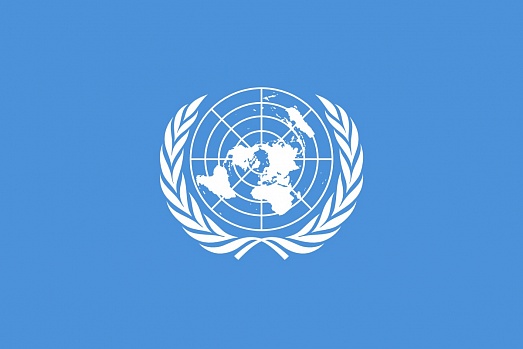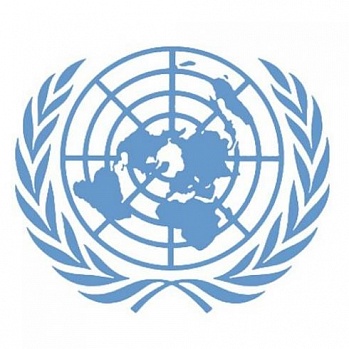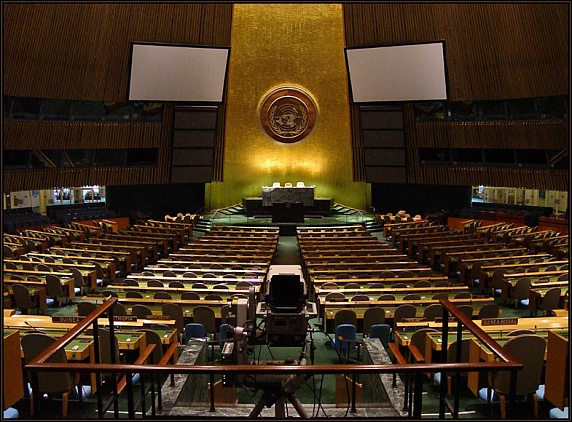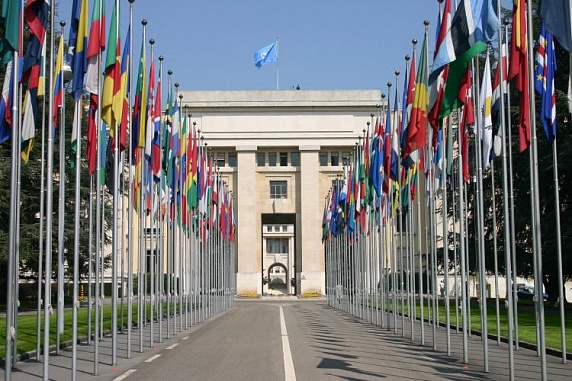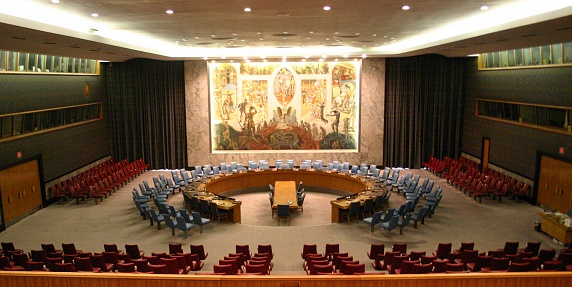 Die UNO
Die UNO
Foreign Minister Sergey Lavrov’s remarks and answers to media questions at a joint press conference following talks with UN Secretary-General Antonio Guterres, Moscow, June 21, 2018
Ladies and gentlemen,
The talks with UN Secretary-General Antonio Guterres were productive, extensive and concrete.
Of course, we discussed the difficult situation that pertains in international relations. We associate this primarily with the attempts to push through unilateral approaches to settling a variety of international problems to the detriment of searching for collective answers to the challenges of our time. Unfortunately, this negative trend is fully reflected in the work of the UN Security Council.
We agreed that the discussion of such key international issues as the situation in the Middle East and North Africa, including Syria, Libya, Yemen, as well as the Palestinian-Israeli settlement is far from being smooth. We talked about the crises that persist in Africa, which don’t lend themselves to easy solutions. We discussed in detail how the UN and its Secretariat can contribute to facilitating progress in these matters.
We also exchanged views on the future of the Joint Comprehensive Plan of Action for the Iranian nuclear programme after the United States announced its withdrawal from this fundamental international legal instrument. We discussed new angles that inspire optimism with regard to developments on the Korean Peninsula and related developments. It was very important for us to hear Secretary-General of the United Nations, Antonio Guterres, clarify his vision of ways to overcome old and new conflicts in today’s world, the number of which, as I said, unfortunately, is not diminishing.
Russia actively participates in the UN member states’ efforts to harmonise the modalities of the Secretariat reform initiated by UN Secretary-General Guterres, which is already at an advanced stage. We support his initiatives aimed at making the UN more effective in addressing the issues facing the international community and achieving this goal through joint efforts and dialogue between all member states.
Russia has always been in favour of strengthening the central role of the UN, the inviolability of the fundamental principles of the UN Charter, the primary responsibility of the UN Security Council for maintaining international peace and security. This is our principled position, which was clearly confirmed yesterday by President Vladimir Putin at a meeting with UN Secretary-General Antonio Guterres in the Kremlin.
We believe that objectivity, impartiality in dealing with acute global problems, and a focus on taking account of the entire range of the member states’ positions guarantee the UN efforts’ effectiveness. We see the UN Secretary-General’s commitment to this kind of work, his sincere desire to help overcome the differences between the main players and find mutually beneficial solutions to existing challenges. We also have great respect for the humanistic agenda that the UN Secretary-General is promoting at the UN in all areas of its activities, primarily, in the context of resolving conflicts and crises.
Once again, I would like to express my satisfaction with the talks.
Question: The other day the United States announced its decision to withdraw from the UN Human Rights Council (HRC) over its resolution criticising Israel. US Ambassador to the UN Nikki Haley denounced the “blind hatred of Israel” expressed in the policies of the HRC, and the day before said that the council criticised Israel “10 times as often as it has criticised Iran.” Does the HRC really pay too much attention to Israel? What do you think about the US withdrawal from the HRC?
Sergey Lavrov (speaking after UN Secretary-General Antonio Guterres): We hope that it is not the final decision and the United States will confirm its commitment to the UN, especially in the vital sphere of human rights.
As you know, the US has considered itself to be a champion in this area. If this is indeed so, there must be arguments in favour of the US working at the HRC and interacting with those whose initiatives and positions do not entirely coincide with those of the United States.
As for the council’s “blind hatred of Israel”, as US Ambassador to the UN Nikki Haley said, I do not share this view. The UN Security Council is obliged to analyse the Secretary-General’s reports on the situation in the Middle East, including the situation on the Palestinian-Israeli track. These reports are based on the decisions that the UN Security Council took in the past. The debates following the UN Secretary-General’s reports are influenced by the events that take place in the Middle East directly between Palestinians and Israelis.
I can tell you that the recent discussions on the violence there, the clashes, the attacks launched against Israel from the Gaza Strip, as well as Israel’s actions in response, have shown that the majority of UN Security Council members have an objective view on the situation. At least, the attacks on Israel have been clearly denounced, including by the Russian delegation.
Question: It is said increasingly often that the UN must be reformed, but [will reform help if] some countries do not implement UN resolutions. For example, four UNSC resolutions on Nagorno-Karabakh have not been implemented in the past 25 years. What can ensure compliance with UN resolutions? Will reform help?
Sergey Lavrov (speaking after UN Secretary-General Antonio Guterres): As I see it, our colleague from the Moscow-Baku agency is asking about the situation with the Nagorno-Karabakh settlement. The resolutions she mentioned were adopted at the height of hostilities. These resolutions, along with some measures taken on the ground, including by Russia, helped stop the bloodshed and launch a political dialogue. All the parties involved agreed to create the OSCE Minsk Group to address the remaining issues, including the liberation of territories and a political settlement, by determining the status of Nagorno-Karabakh. This is what we have been doing since then.
Russia, the United States and France as co-chairs of the OSCE Minsk Group have been working, with the consent of Baku and Yerevan, to attain their goals. But this is only possible if there is consensus between the parties to the conflict. I am sure that the probability of a settlement will greatly increase as soon as we start moving in this direction.
Question: What can you say about cooperation with the US in the context of the United States saying it would be possible to make progress in settling the Syrian crisis and the DPRK issue at the summit. Are there any contacts with the US with regard to holding this summit? Is it true that National Security Adviser to President Trump John Bolton will be in Moscow soon?
Sergey Lavrov (speaking after UN Secretary-General Antonio Guterres): President Vladimir Putin has repeatedly pointed out that, in our opinion, whenever the United States and Russia cooperate in order to resolve an international problem, in most cases they succeed in doing so. All members of the international community benefit from this. We operate on the premise that this is what many countries are actually looking for. The UN Secretary-General just confirmed that he considers it important that our countries cooperate, rather than remain in a position where our relations are undermined by artificially created problems dating back to the Obama administration.
We are open to a dialogue with the US on all issues. Undoubtedly, normalising just bilateral relations would go a long way to promoting more effective and closer interaction in the international arena. So, our proposals on how to overcome well-known irritants in bilateral relations have been sent to Washington more than once. The last time I sent them was to new US Secretary of State Mike Pompeo.
Concurrenly, we are ready to act precisely in this way in international situations, where we can interact already now. As you may be aware, we maintain diplomatic and military contacts on the Syrian settlement, and, at the same time, we maintain close relations with the UN, the Secretary General and his Special Envoy for Syria, Staffan de Mistura. So, I’m aware of the leaks in Washington to the effect that a summit is about to be held or there will be a proposal to hold it. We do not comment on leaks. However, everyone is aware that we are always willing to establish contacts. So, if we agree on a meeting at a high or the highest level, we will, of course, make proper announcements.
Question: A report is out accusing the Syrian army and its allies of war crimes committed during the liberation of Eastern Ghouta. The report is based on certain data. What can you say about it? To what extent are the data cited by the UN objective, given that the report also makes accusations against armed formations based in that region?
Sergey Lavrov: I’m not aware of it. As far as I understand, the issue is about a report compiled by the Pinheiro Commission, also known as the Human Rights Commission, which received its mandate through a rather vague voting procedure in the Human Rights Council, and engages in remote examination – from a humanitarian point of view – of certain situations that arise in Syria. The commission does not do onsite inspections. As I heard today in the news, it uses data from social media and videos made by witnesses. I heard it allegedly interviewed 140 people, and so on and so forth.
We are very skeptical about distance methods when doing this kind of work, whether it be war crimes in general or the use of chemical weapons. We have already provided many comments on the ways such sensational news are often engineered.
I saw a televised story today, I think it was Euronews, which commented on the release of this report. They said it contains documented war crimes committed by the Syrian government and illegal armed groups. This text was read as they showed the already well-known video, where the boy named Ayman is being doused with water allegedly in an attempt to save him from a chemical agent.
Euronews is a respectable TV channel. What’s more, it claims to be the most objective one, as they refer to themselves, which broadcasts all views without exception. As you may remember, the story with Ayman did not end there. After the specialists watched the video and wondered why nothing in it looks realistic from the perspective of what an agent does to humans, we made arrangements with the Syrian government and brought Ayman, his parents and other participants of this video to The Hague to the Organisation for the Prohibition of Chemical Weapons, where they said they were approached by the White Helmets, which the US recently resumed funding, who began to pour water on them.
So, when our esteemed colleagues from the media carry such news, I still very much hope that the picture is not going to be one-sided, but rather will show the story from different angles and present all publically available facts.
